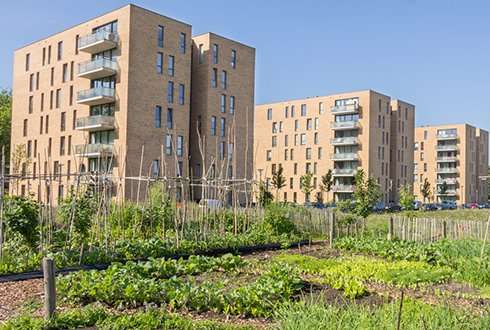Five business models for urban farming

There is good money to be made in urban farming. Wageningen UR research into business models found five different options and showed how smart urban farmers can best choose for a combination.
Marcel Vijn, researcher in urban-rural relations at Wageningen UR, supports farmers, urban businesses, municipalities and project developers with questions on urban farming. "There are lots of developments in and around cities," he says. "Farmers on the city outskirts see that urban farming offers opportunities for operating more independently by creating a unique, local market. And municipalities don't know what to do with undeveloped lots. They are eager to provide urban farmers with land, partially because it can be linked to a variety of meaningful social functions."
Real estate project developers
Project developers also see the benefits of urban farming, according to Jan Willem van der Schans, expert on short food supply chains and regional food systems at Wageningen UR. "They bought large plots of land around cities for future housing but the economic crisis has meant that many residential developments are far from 'completed'. Allowing the land to be used for urban farming creates a positive vibe: well-kept green public space, playing children and common activities."
Entrepreneurship
Urban farming may have the wind in its sails but it still needs to be profitable. Municipalities are short of funds and cannot provide subsidies at random. According to Vijn, entrepreneurship is key: "One could focus on a niche market, such as producing exclusive cheese with milk from Dutch Deep Red cattle – a rare cow breed, for example. Or combine the sale of food products with a café or restaurant or a care function for people with disabilities."
Multiple revenue model
From a business management perspective, urban farming is atypical, explains Van der Schans, who analysed the financial situation of urban farmers. "In business management it is a golden rule that a company's strategy should be based on one clear-cut revenue model. For urban farming, however, a mix of business models may be a good foundation for survival."
Smart combination
Van der Schans refers to a video in which 'farmer John' combines five business models in a clever way. John chose to keep rare cattle breeds (differentiation) and also grows vegetables and fruit which he sells in his own farm shop using people with limited job opportunities (diversification). Moreover, John uses residual heat and organic compost from the city (low costs). City residents perceive the farm as a peaceful oasis and visit regularly (experience). A painter's club uses the location to organise workshops and considers the urban farm as its home base (shared ownership).
Business plan
Urban farming is not a hype, Marcel Vijn adds, although he does not deny that it has its ups and downs. He therefore recommends entrepreneurs to always draw up a proper business plan. "This should be (primarily) based on market based earning potential and not (only) on possible subsidies. They should take a close look at the business models available and choose the aspects that suit them best."
Provided by Wageningen University





















